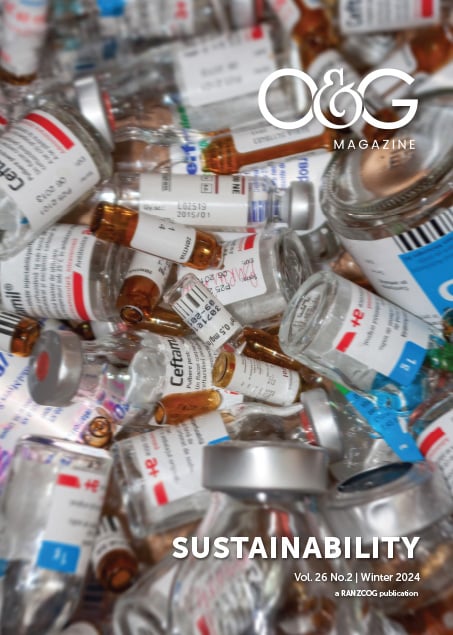Tara Forde (she/her) is a member of RANZCOG’s Consumer Network Working Group and is an avid fan and user of O&G services. She is a proud mum to two toddlers and a public servant in Wellington, Aotearoa. She looks forward to living in a world with a stable climate.
Bringing new life into the world is a momentous life-changing event. For me, my baby, and my whānau. But this shouldn’t come at the expense of the planet. How to integrate sustainability into childbirth is something new parents are increasingly thinking about. I want to bring my children into the world in ways that uphold my values. And of course, I want my baby here safely and well too.
Having strong environmental values is increasingly something that society expects more. We know climate change is real, we know we all need to take action to reduce our greenhouse gas emissions. Australia’s health system contributes approximately 7% of the nation’s CO2 emissions — an output equivalent to the whole of South Australia.1 Aotearoa’s health system is estimated to emit between 3 and 8% of the country’s carbon emissions.2 The health sector knows it is facing challenges with sustainability. The five most significant sectors within healthcare in Australia regarding total CO2e emissions were: public hospitals 34%, private hospitals 10%, other medications 9%, benefit-paid drugs 9%, and capital expenditure for buildings 8%.3
The good news is that health systems are part of both the problem and the solution. New Zealand is leading the developed world on phasing out a potent greenhouse gas used in surgeries4. Desflurane is one of a cluster of gases used in healthcare to put patients to sleep for surgery. All-coal boilers are being removed in New Zealand hospitals, at considerable government investment. What is good for the environment is also good for health. People shouldn’t be going to hospitals to be exposed to dirty particulate matter that makes them sick.
Each of these steps towards environmental sustainability and lowering carbon emissions has required leadership and concerted efforts of people working together. People at each stage of their health journey are now starting to ask about the environmental footprint. As a consumer, I am increasingly seeking to ensure my actions and planetary impact are aligned with the values I profess. I think this is challenging in O&G specialties, but particularly relevant.
When I have birthed my babies, I will freely admit the environmental consequences were not my first thought. I have been vulnerable and confused, in pain and needing relief, and then flooded with love. I have wanted and required medical assistance and oversight to keep things on track. I may want less waste and safely reusable medical instruments but it won’t be me driving it on my big day. Consumers alone cannot bring about these changes in the health system.
It will be the people at work, the medical professionals who hold sway and have the power to change these things. It requires structural change and will require medical professionals’ leadership. It will require your advocacy, involvement, and decision making, to ensure patient and planetary needs are met. It will require diversity of actions, from action plans, investments, working groups, hospital committees, government intervention, baseline monitoring and reduction, supply chain investigation and whatever other creative expression we can wrangle to impact change. I urge you to get involved and use your abilities as we are in the fight of our lives to maintain a liveable planet.
As a patient, I am aware there is always a prioritisation and balancing of needs that goes into so many decisions within healthcare. It does make me uncomfortable to think that my healthcare would be compromised in pursuit of sustainability. There will be challenges of ensuring patient voice and experience is still heard in this time of change. Having patients involved in these decisions will ensure people further trust the care and provision of our health system. The trade-offs made must uphold the ethos of do no harm. And if compromises are to be made, I want to know it is for a significant and meaningful change in our health system, and ideally, I want to be involved as a consumer in those decisions.
The health system cannot afford to see itself as above these challenges. Of course, when you need medical treatment, you want the best. So, what structural changes can we make to enable better individual decision making in the moment? We know there are social determinants of health that drive so many of the cases that end up needing intensive intervention. As I am sure you are aware, these are long-term and structural issues that aren’t going away. We can always do better. I am asking O&G specialists to consider what ability they have to impact change and use that power. And consider how the patient’s interests are being represented in that process. And then let’s all mahitahi (work together) to make it happen.
References
- RACP Statement on Climate Change
- Sustainability and the Health Sector: A guide to getting started. Te Whatu Ora – Health New Zealand. 2023.
- The carbon footprint of Australian health care, www.thelancet.com/planetary-health Vol 2 January 2018(thelancet.com/journals/lanplh/article/PIIS2542-51961730180-8/fulltext#seccestitle160)
- stuff.co.nz/science/113447284/nz-health-care-has-a-climate-change-problem






Leave a Reply